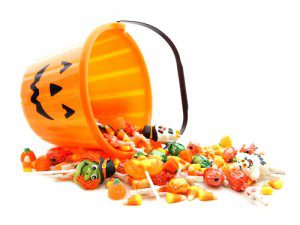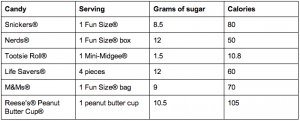Trick or Treat? How the Most Popular Halloween Candies Can Harm Your Teeth
 Like many American holidays, Halloween involves plenty of sweets that contain added sugars. Even many “fun size” candies contain half the recommended amount of sugar per day. Below are the top six most popular Halloween candies that are given out at Halloween, along with the amount of sugar in each.
Like many American holidays, Halloween involves plenty of sweets that contain added sugars. Even many “fun size” candies contain half the recommended amount of sugar per day. Below are the top six most popular Halloween candies that are given out at Halloween, along with the amount of sugar in each.
While there is no exact recommendation from the American Dental Association for how many grams of sugar one should eat to avoid tooth decay, the American Heart Association recommends a maximum amount for optimal health:
– Men: 150 calories per day (37.5 grams or 9 teaspoons).
– Women: 100 calories per day (25 grams or 6 teaspoons).
This means that when you “help” your kids eat the Halloween treats they’ve received, mom can have just two Reese’s® Peanut Butter Cups®, while dad (lucky him), can have three.
How does sugar harm the teeth?
Plaque is a naturally occurring substance in the mouth that results from bacteria. Each and every time sugar or starch comes in contact with bacteria in the mouth, acid is produced. This acid can eat away at the teeth for up to 20 minutes after the sugary food or beverage is consumed. This can eventually lead to cavities or worse problems for your oral health.
How to Control your Sugar Intake
Aside from simply avoiding sugar all together, here are a few simple tips to keeping your sugar intake under control this Halloween season:
1. Plan ahead
Explain to your family why monitoring the amount of sugar you eat is so important for oral and overall health. Make sure they know ahead of time that they will just be consuming about two treats per day — not the whole bag of candy at once.
2. Hand out candy alternatives
Set an example for your family by handing out healthier alternatives, such as bags of trail mix or granola bars. You can also hand out stickers or small toys.
3. Rinse your mouth
After consuming sugary food, candy, or drinks, simply rinsing your mouth with water can help remove some of the acid from the teeth. Brushing the teeth is always best, but rinsing with water is better than letting the acid fester on the teeth until you have the time to brush.
If you suspect you have a cavity or any other oral health concern, Dr. Sands would be happy to see you at his Beverly Hills office. To schedule an appointment, call (310) 273-0111 or fill out our online contact form today.
